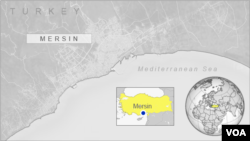Some 400,000 survivors of February’s earthquake in southern Turkey have arrived in the coastal city of Mersin over the past two months, according to its mayor, who has pleaded for more government help to cope with the influx.
Located a couple hundred kilometers west of the fault lines that caused the February 6 earthquake, Mersin was spared any damage. However, the city is now struggling to cope with the influx of survivors, along with Syrian refugees, according to its mayor, Vahap Secer.
“The population of our city was 1.9 million. Currently, it has reached 2.7 million, 400,000 of which are asylum-seekers and 400,000 of which are earthquake victims. Housing prices have increased by 200 percent,” Secer told the Haberturk news website last month.
Some of the earthquake survivors have been given shelter at the city’s vast exhibition hall. Yasar Batman, his wife and their four children fled their home in the devastated city of Antakya and arrived in Mersin a week after the earthquake.
“Everywhere had collapsed, the people around us all died. Our house did not collapse, but the gas in the house exploded. Now, slowly, we try to get over this,” Batman told VOA. “Thank God, they are taking care of us here, they try to make up for what we lack as much as they can. Mersin municipality provides us with bread and food in the best way they can. I hope they will build a house for us as soon as possible, and we can go to our home city as soon as we can.”
In an adjacent cubicle in the exhibition hall, Abdurrahim Bal described how he tried to remain in Antakya.
“We asked for a tent and other things while we were there in Antakya, but so far we have not received anything,” he told VOA. “If they give us one, we will go there. But life is difficult there, even if you live in a tent. It is raining and there are storms.”
Local concerns
The influx of survivors is causing problems in Mersin. Local officials say basic services like the health system and water supply are under growing pressure.
City residents told VOA prices are already high because of the influx of refugees fleeing the war in Syria.
“A few years ago, life was easier. Rents were lower, shopping was cheaper. After Syrians came here, the rents went up and the prices doubled. After the earthquake, it went up even more,” said Ayten Demirezer, a longtime resident of Mersin.
Her husband, Kalender Demirezer, said the pressure on the city is overwhelming.
“It is not possible for this city to support 400,000 people," he told VOA. "Still, many of our friends are looking for a house to rent. And now those people came from Hatay [province, in the earthquake zone]. Syrian [refugees] also have rights. They are also human beings, but this city cannot cope with this. We need to support our own people first.”
Mersin is not in the official disaster zone and so does not qualify for emergency government funds. In February, 47 charities and nongovernmental organizations in Mersin wrote an open letter calling for the city to be included in the emergency funding plan. The city’s mayor says Ankara has so far declined to give the city special status so it can receive extra support.
Memet Aksakal contributed to this report.






